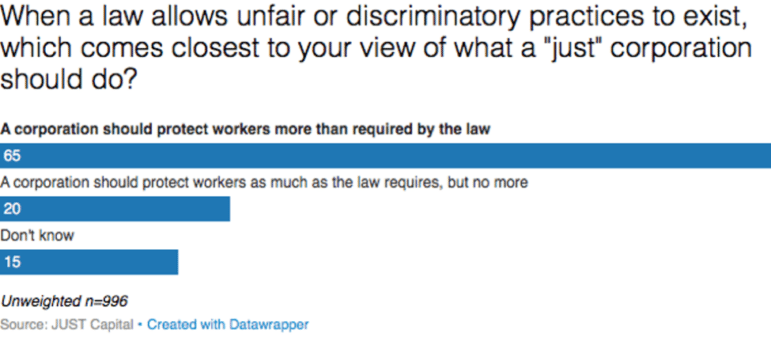
July 31, 2017; Forbes and CBS News
As we watch the unraveling of years of civil rights laws and protections by the current administration, the question of who will stand up against discrimination hangs in the air. When it comes to discrimination in the workplace, a new survey by JUST Capital indicates that Americans think this responsibility falls on corporations and employers. This data takes that responsibility a step further to say that corporations should protect workers more than required by law when a law allows unfair or discriminatory practices to exist.
Respondents to this survey who felt that corporations had a responsibility to go beyond what is required by law transcended race, ethnicity, and gender. While there were small differences in political affiliations, there was an across-the-board agreement of over 59% for increased corporate responsibility. As reported by Forbes, “There’s little ambiguity in these responses. Substantial majorities of Americans, regardless of demographics or political orientation, think that just corporations should go beyond the laws to protect workers from discrimination.”

Sign up for our free newsletters
Subscribe to NPQ's newsletters to have our top stories delivered directly to your inbox.
By signing up, you agree to our privacy policy and terms of use, and to receive messages from NPQ and our partners.
Corporations, it seems, agree, but their focus seems to be less about discrimination and more about the bottom line. One only need look at the current efforts in Texas, led by Lieutenant Governor Dan Patrick, to enact a “bathroom bill” law that would require transgender persons to use a restroom designated by the gender on their birth certificates rather than the gender identities they now have. The corporate response to this has aligned with that of civil rights groups, as reported by CBS News:
Money talks, especially when it’s potentially lost profits for nervous businesses. Less than six months ago, legislators in North Carolina repealed a law that restricted bathroom access for transgender people—after the state’s business leaders howled about an economic hit pegged at $630 million.
Now, businesses in Texas are worried that legislators there are going to make the same mistake, which could cost the Lone Star State $5.6 billion through 2026. And they’re making their feelings known.
Dealing with legislation and laws that revoke protections or that allow discrimination becomes a way for corporations to both protect their bottom line and present themselves as champions for those who are subject to discrimination. As reported in the Texas Observer in 2016 when this bathroom law was first proposed, the board of the state’s 4,300-member chamber of commerce overwhelmingly approved a resolution opposing “legislation that is seen as discriminatory and would impact workforce recruitment and/or cause a negative economic impact on the state,” according to the president of the Texas Association of Business, Chris Wallace.
The unknown in this survey data and from the corporate responses to government-sponsored discrimination is whether corporations would continue to stand up for their workers if there were no impact on their bottom line. Perhaps it is best not to know.—Carole Levine













